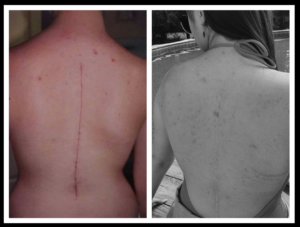December 30, 2018
Well hello again, long time, no blog! It has clearly been a while since my last founder’s blog, but that’s just because InvisiYouth Charity has been keeping me so damn busy. (*and if you’ve been keeping up with InvisiYouth, you’ve gotten to know the reason for that is our new video podcast series, InvisiYouth Chat Sessions, which I am the host…which will be continuing throughout 2019*)
So, let’s get real for a minute.
One thing I’m a firm believer in is to always celebrate your small victories, and especially while you live with chronic illness/disability. You should be proud of all you achieve, regardless of the scale. But one of our volunteers reminded me of a milestone I just reached—10 years since the injury that caused the snowball of chronic illness into my life.
I’m aware it may see odd to celebrate my chronic illnesses. And yes, they really did take my life from me while my illnesses were a daily torture, but living with health struggles has also given me a life, a new normality, that I am incredibly proud of. While that’s my optimism trying to stay in focus, I refuse to stay in a mindset of resentment for my life.
As a resident “oldie” of my illness for a decade, I wanted to share my hindsight of life with chronic illnesses and the top 10 things I’ve learned after these 10 years:
#1 Diagnosis Won’t Be a Magic Wand, But It Sure Feels Nice
This is probably one of the biggest things I’ve gained hindsight on, while also being the most controversial. It took me years to get proper diagnosis, years with mistreatment that could have improved my now-quality of life, but there’s something anyone that reads my work will notice. I rarely write down my diagnoses, and there’s a reason. Still to this day, I have had diagnoses given to me and taken away, some putting “undiagnosed” in front new diagnoses in my medical charts while others were certain. I used to put so much pressure on getting the name, getting the diagnosis and THEN I would be able to go through recovery and my new way of living. I wanted some claim of community for what I experienced. But even when I got one, it didn’t change much for me. I still heard from doctors “well, this isn’t an illness we can cure, so we can just help you cope with it.” The longer I lived without diagnosis, the longer I realized that it would not ‘fix’ what I was experiencing in my daily life. Now yes, I am very aware some illnesses have amazing treatment which you get from a proper diagnosis, and that a diagnosis can really validate the patient experience because it allows them to belong and justify their health struggles. But for so many, the diagnosis isn’t the “cure it” pill, but rather the name we get to identify with. In hindsight, I learned that a diagnosis was less of a magic wand, and more of an identity helper and validation tool. I know I relate to a few different chronic illness communities, and my doctors are doing all they can to help with my health’s symptomatic issues, so a word doesn’t hold as much weight to me anymore.
 #2 Celebrate the Small Daily Wins, Not Your “Literal” Falls
#2 Celebrate the Small Daily Wins, Not Your “Literal” Falls
So often, we focus on what our bodies limit us from doing, what our chronic illnesses have taken away from our lives. And that Negative-Nancy mindset can do a lot of damage on your emotional wellbeing when all your mental energy is focused on what goes wrong in your day and your health. When one thing goes wrong, it can feel like a domino-effect, or in my case, my own literal falls (since that tends to happen a lot). But when you’ve lived with a chronic illness for years, you gain a retrospective mindset because you’re able to look back on the periods of bad and good health. It makes you realize that if you celebrated those wins, all those days—or even hours—of stable, good health, then you’d be able to feel achievement and pride.
You’d be able to realize the focus of your energy is better served on those good moments, instead of all the setbacks and bad days. I remember hearing the notion “every day may not be a great day, but you can find something great in each day” and that was what I began to live by a few years into my health journey. Even if the best thing that happened was that I got out of bed, it was at least one thing I did well that day. When I gave full over-the-top celebration on each of my little wins with my health, it made my mentality more positive. It would start to feel oddly annoying when I had health setbacks because I wasn’t focused on the bad it caused in my life for most each year. The goal was to never give my chronic illnesses more power than they already had, so daily mini-winning parties for me.
#3 Become Your Best Researcher, Advocate and Nurse (knowledge=EMpowerED)
 Knowledge is power. You need to be able to fight for your rights, for what you need to best help your life with health struggles. So much was bounced over me, especially when I was a teenager and still a minor in the eyes of the medical community. That may have been the case, but it was still my body, my health, and my life. I was lucky…my mom is an incredible nurse and has instilled in me the idea that no one will be a better advocate than YOU, so ask all the questions, inquire and research anything that may be done for you, and always get a second opinion on major medical decisions. I was taught how to advocate for my medical needs, how to research on the treatment options, to ask accurate questions, and have intelligent discussions with my doctors. But this is not something everyone knows right when their health declines, it’s a trait to learn and sharpen. With hindsight, I know that my health deserved my research and support to improve. I hear from lots of young adults that work with InvisiYouth “I’m the best researcher and nurse for my chronic illnesses, because I know my health and life better than anyone.”
Knowledge is power. You need to be able to fight for your rights, for what you need to best help your life with health struggles. So much was bounced over me, especially when I was a teenager and still a minor in the eyes of the medical community. That may have been the case, but it was still my body, my health, and my life. I was lucky…my mom is an incredible nurse and has instilled in me the idea that no one will be a better advocate than YOU, so ask all the questions, inquire and research anything that may be done for you, and always get a second opinion on major medical decisions. I was taught how to advocate for my medical needs, how to research on the treatment options, to ask accurate questions, and have intelligent discussions with my doctors. But this is not something everyone knows right when their health declines, it’s a trait to learn and sharpen. With hindsight, I know that my health deserved my research and support to improve. I hear from lots of young adults that work with InvisiYouth “I’m the best researcher and nurse for my chronic illnesses, because I know my health and life better than anyone.”
#4 Reminiscing About the Past Can Hurt Sometimes
 We can always learn from our past, but when you have a specific marker that defines “before I got sick” and “after I got injured” your past can feel bittersweet. I used to always focus on my past and feel like I wasn’t progressing enough with my health, that my chronic illnesses had done so much damage to my life. And in a way, that could be true. The dream of playing tennis competitively on the pro-circuit died, my social network diminished, and my physical health deteriorated. But it didn’t mean I wasn’t still living my life or I wasn’t proud of the life I was building. So, when I constantly was looking at what my illnesses had taken from me, I was damaging my emotional wellbeing, and that began to hurt. My past with pristine health is something I love, and now I look at it with a great deal of fondness. But the way I’ve handled it is to look at it in those two separate parts: the before and after. If I stay in a mindset of “what ifs” then I lose my positivity, and that is not something I am willing to do. I have learned over the years since my injury, I have learned to have respect for all the years of my life, and to never feel bad or ashamed of my illnesses. By doing that, I don’t focus on what my past looked like, but rather how I have strengthened into the woman I am, how I’ve become more empathic and how I have been able to thrive in my life. I focus on the now, while giving importance to the past and future when it relates to my memories and my dreams, or my medical history, of course!
We can always learn from our past, but when you have a specific marker that defines “before I got sick” and “after I got injured” your past can feel bittersweet. I used to always focus on my past and feel like I wasn’t progressing enough with my health, that my chronic illnesses had done so much damage to my life. And in a way, that could be true. The dream of playing tennis competitively on the pro-circuit died, my social network diminished, and my physical health deteriorated. But it didn’t mean I wasn’t still living my life or I wasn’t proud of the life I was building. So, when I constantly was looking at what my illnesses had taken from me, I was damaging my emotional wellbeing, and that began to hurt. My past with pristine health is something I love, and now I look at it with a great deal of fondness. But the way I’ve handled it is to look at it in those two separate parts: the before and after. If I stay in a mindset of “what ifs” then I lose my positivity, and that is not something I am willing to do. I have learned over the years since my injury, I have learned to have respect for all the years of my life, and to never feel bad or ashamed of my illnesses. By doing that, I don’t focus on what my past looked like, but rather how I have strengthened into the woman I am, how I’ve become more empathic and how I have been able to thrive in my life. I focus on the now, while giving importance to the past and future when it relates to my memories and my dreams, or my medical history, of course!
#5 Let Yourself Wallow…But You Only Get One Hour
People have this ideal notion that you’ve got to be happy all the time. That if you feel sadness as a direct effect of your chronic illness/disability, you are not fighting hard enough for your health. I started to feel like I needed to be positive, to always find the goodness in my struggles, because people were “inspired” by my inner fight and “motivated” by my positive outlook. And while that is true, that is because I let myself grieve my old life and feel for the literal pain and discomfort I have each day. I can be strong and positive because I know when to let myself feel bad. With a decade of chronic illness-life under my belt, I can see it was a great decision to let myself wallow for all my chronic illnesses have pained me. But what I learned is now the advice I give: allow yourself time to wallow, but make sure it only maxs out at one hour. I give myself this time limit for a reason. If I let myself continue to feel bad about my health struggles, it will fester and to climb out of that depressive dark hole is a huge challenge. But you should be allowed to experience all the emotions of life with health struggles. You are a human being and that spectrum of emotions deserves to be felt. It is something that has worked so well for me because I allow myself to feel all the sadness and mourning and pain that is physically tortuous on my health, but I never let it overtake me. Sit in your emotions, but know you are in just as much control of your life as your chronic illness/disability is of your physical health. When I realized my own strength, but also allowed myself to feel bad, it allowed that positive mindset to shine, so let that positive focus to thrive be your superior emotion.
#6 Be Fearless to Help Yourself in Public. You Won’t See those Judgy Strangers Again
 To this day, my friends will say they know the minimum about my health struggles—many of them not even knowing the extent till they came to InvisiYouth fundraisers or my public speaking engagements. But that decision was because I was always a private person, and never felt the details needed to be shared. I relied on the invisible nature of my chronic illnesses so it would never be the first thing people noticed about me. But when my symptoms and health struggles expanded into the physical, everyone would notice, feel pity, or ask prying questions. After a couple years of worrying about what others thought, I spoke with my mom and she got real with me. “Why are you worrying about people’s opinions? You never see them again, and it’s just stressing you out unnecessarily.” I flipped a switch and stopped caring about the wandering eyes and whispered comments. We’ve got lots to worry about with chronic illness, so worrying about what other people are judging us for when they pass by should NOT be on the list. They are strangers and not substance to what makes you who you are. And let’s get real…even I fall victim to worrying about what others think on occasion.
To this day, my friends will say they know the minimum about my health struggles—many of them not even knowing the extent till they came to InvisiYouth fundraisers or my public speaking engagements. But that decision was because I was always a private person, and never felt the details needed to be shared. I relied on the invisible nature of my chronic illnesses so it would never be the first thing people noticed about me. But when my symptoms and health struggles expanded into the physical, everyone would notice, feel pity, or ask prying questions. After a couple years of worrying about what others thought, I spoke with my mom and she got real with me. “Why are you worrying about people’s opinions? You never see them again, and it’s just stressing you out unnecessarily.” I flipped a switch and stopped caring about the wandering eyes and whispered comments. We’ve got lots to worry about with chronic illness, so worrying about what other people are judging us for when they pass by should NOT be on the list. They are strangers and not substance to what makes you who you are. And let’s get real…even I fall victim to worrying about what others think on occasion.
 Recently, I went into NYC for a brunch with this lovely British blogger while she, her older brother and her boyfriend were celebrating her brother’s birthday. At that time, I had to use a cane and on my commute, I used it and got lots of stares that it didn’t faze me. But the moment I got to the restaurant, I put the cane away to make sure they did not know my medical status. I hid the cane in my bag, suffered the few steps to our table and back outside without these three new friends knowing anything. And the second I was out of sight, I grabbed my cane. Even I have moments of self-doubt, but I don’t let them define me. I could have used my cane in front of them (her brother has one of the same chronic illnesses I do) but for that 20% of my day, I concealed my reality. That is okay…because 80% is greater than 20% and I made it a point to use my cane for all my meetings, family gatherings and shopping trips in the days after. Because I am fearlessly confident with my chronic illnesses, and moments don’t define a life!
Recently, I went into NYC for a brunch with this lovely British blogger while she, her older brother and her boyfriend were celebrating her brother’s birthday. At that time, I had to use a cane and on my commute, I used it and got lots of stares that it didn’t faze me. But the moment I got to the restaurant, I put the cane away to make sure they did not know my medical status. I hid the cane in my bag, suffered the few steps to our table and back outside without these three new friends knowing anything. And the second I was out of sight, I grabbed my cane. Even I have moments of self-doubt, but I don’t let them define me. I could have used my cane in front of them (her brother has one of the same chronic illnesses I do) but for that 20% of my day, I concealed my reality. That is okay…because 80% is greater than 20% and I made it a point to use my cane for all my meetings, family gatherings and shopping trips in the days after. Because I am fearlessly confident with my chronic illnesses, and moments don’t define a life!
#7 Even in the Hard Days, Just Try to Laugh Because It Helps You Cope
 With InvisiYouth and in my daily life, I firmly believe that laughter is the best medicine. For me, I have truly seen the way my humor, or blunt sarcasm, has helped me cope with my chronic illnesses. When things get bad medically and you’re told your limitations, I found humor was not just a cushion from my harsh reality, but a way I could look at life. Humor supports your emotions. And sometimes with all life can throw at you when you’re living with chronic illness, you just want to laugh so you don’t cry. But I also view laughter not just as literal laughing at my medical problems, but experiencing humorous moments too! When I wasn’t as mobile or active in my past, I would find TV shows, YouTube channels or movies that would make me laugh. Even if it was as basic as TV show review podcasts, if it got me to laugh while my health struggles were tragic, then all was being done well. Sometimes we need to take our chronic illnesses/ disability seriously, focus on how our bodies can manage hour-by-hour, handle new treatments or hospital stays. The need for humor in our lives should to be prominent too. How else can you handle diagnosis, setbacks and side effects unless you laugh at your bad days? In hindsight, I can easily say my dark humor is one of the largest factors that got me through my lowest lows, and got me to the stage of my new normal ten years later!
With InvisiYouth and in my daily life, I firmly believe that laughter is the best medicine. For me, I have truly seen the way my humor, or blunt sarcasm, has helped me cope with my chronic illnesses. When things get bad medically and you’re told your limitations, I found humor was not just a cushion from my harsh reality, but a way I could look at life. Humor supports your emotions. And sometimes with all life can throw at you when you’re living with chronic illness, you just want to laugh so you don’t cry. But I also view laughter not just as literal laughing at my medical problems, but experiencing humorous moments too! When I wasn’t as mobile or active in my past, I would find TV shows, YouTube channels or movies that would make me laugh. Even if it was as basic as TV show review podcasts, if it got me to laugh while my health struggles were tragic, then all was being done well. Sometimes we need to take our chronic illnesses/ disability seriously, focus on how our bodies can manage hour-by-hour, handle new treatments or hospital stays. The need for humor in our lives should to be prominent too. How else can you handle diagnosis, setbacks and side effects unless you laugh at your bad days? In hindsight, I can easily say my dark humor is one of the largest factors that got me through my lowest lows, and got me to the stage of my new normal ten years later!
#8 Body Positivity ≠ 24/7 Body Confidence
It used to feel like such a challenge to remain confident about my body for a couple reasons. Firstly, I have a distinct “pre-illness” life I can remember before the injury. And I had a competitive athlete’s teenager physique, so there had to be a deep acceptance my body may never look that way again. Secondly, my health struggles are physically taxing, so I go from living with an invisible illness to an illness that morphed, damaged and scarred parts of my body. It’s literally painful to use my entire left side, and even though a decade into it, I’ve learned how to live this new normality with quality, it means I “workout to be in shape” more uniquely than most. But the truest way I’ve gained confidence with my body is finding an appreciation that it does work for me. I’m grateful when I can climb a flight of stairs because I remember when that wasn’t possible. I am the only one that must live in my skin, so if I’m not going to find my body beautiful, it won’t matter if anyone else does. So, I have learned over these 10 years to find confidence in the functional body I have to work with, instead of desperately desiring more toned legs or smaller hips and a slimmer face. And now, I have such a respect for what this body of mine is capable of, the battle scars I find sexy and the imperfections that make me the woman I am. This body has fought my chronic illnesses with me, and that helps with my body positive mindset.
#9 Ask for Help When You Need it and That Will Make You Stronger
 How I wish I accepted this earlier! When I was in the early stages of health struggles, I hated asking for help. It felt like a defeat or failure. Like my hours of physical therapy, focus on treatments and doctor visits hadn’t worked and I wasn’t doing enough. But what took me years to realize was a simple fact: Even my friends without chronic illness/disability needed to ask for help at times. Now granted, my requests and needs are a bit more major and frequent, but looking back, I made my daily life harder than necessary to live without asking for help. I physically struggled walking and interacting in classes because I didn’t want anyone to know it was hard for me.
How I wish I accepted this earlier! When I was in the early stages of health struggles, I hated asking for help. It felt like a defeat or failure. Like my hours of physical therapy, focus on treatments and doctor visits hadn’t worked and I wasn’t doing enough. But what took me years to realize was a simple fact: Even my friends without chronic illness/disability needed to ask for help at times. Now granted, my requests and needs are a bit more major and frequent, but looking back, I made my daily life harder than necessary to live without asking for help. I physically struggled walking and interacting in classes because I didn’t want anyone to know it was hard for me.
 I strained my limitations to meet deadlines, which caused medical setbacks that left me weeks to recover. But asking for help is not a sign of weakness, but rather, it is a sign of strength. You are so connected with your medical needs that you are willing to gain support to achieve goals. That makes you stronger than anyone because you know what your goals are and have passion to get things done, and those are signs of an independent and successful person. I started to become less afraid of saying “Can you help me?” or “Do you know how to adapt this to what I can do?” Word of advice: ask for help because you want to live your life with purpose, and while it’s totally normal to feel like you’re bothering people, realize each supporter will make you stronger.
I strained my limitations to meet deadlines, which caused medical setbacks that left me weeks to recover. But asking for help is not a sign of weakness, but rather, it is a sign of strength. You are so connected with your medical needs that you are willing to gain support to achieve goals. That makes you stronger than anyone because you know what your goals are and have passion to get things done, and those are signs of an independent and successful person. I started to become less afraid of saying “Can you help me?” or “Do you know how to adapt this to what I can do?” Word of advice: ask for help because you want to live your life with purpose, and while it’s totally normal to feel like you’re bothering people, realize each supporter will make you stronger.
#10 Don’t Fake Smile to Pacify Others. YOU are the Only One Living This Life
I could not have picked a better piece of reflection on my ten years of chronic illness life than this one. As I began to live my life with chronic illness longer and longer, my health became my identifier. I was no longer just Dominique, but the ‘sick’ friend. I wasn’t part of the conversation, but the full medical dictionary to the questions thrown at me. And the more I interacted with “healthy/able-bodied” people, the more I ‘put on’ a happy face. I felt guilty if other people knew how bad things were medically because it felt like they were going to start pitying me more too. I pacified others constantly being “the happy, strong girl with health struggles” who never complained and always said “it’s okay.” But the only person that it was affecting was me. It was me who had to put extra energy into “feeling as healthy as I looked” and that wasn’t fair. I learned since I was the one person that had to live inside this body all year-round, I had to find ways to adapt to it. And if my illness struggles bothered people, if my realness was too much, then that had to be okay, and they were not the right people to have in my life. Don’t hide how you are feeling from other people. Life isn’t perfect, it is multi-faceted and messy at times, and don’t make everyone around you comfortable when you are not. Live your life the way you want to live it. And the people that love and respect you, the people that are the most compassionate are the same people that will stick around during all your “faces of emotions” and will open their minds and hearts to empathize with your experiences.
When you were not born with a disability or chronic illness, 10 years of health struggles is a long time. It takes up such a part of way you live and view the world and yourself. And that lets you take a step back, and learn and appreciate all you’ve experienced. Dig deep and you will be proud of the thriving life you make for yourself with all its medical quirks and adaptations, trust me!
~Dominique




